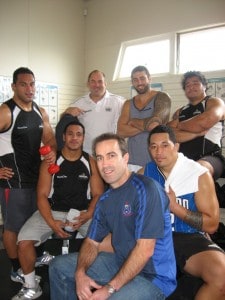
Pumped up for World Cup action, five of six Hawke’s Bay-based members of the Manu Samoa squad with, centre front, performance analyst Marcus Agnew and, centre back, coach Tom Coventry. From left back, the players are Kas Lealamanua, Kane Thompson and Logovi’i Mulipola, and from left front, Sinoti Sinoti and Anthony Perenise. Absent is Kahn Kotuali’i.
Many seasoned rugby followers are tipping Manu Samoa as the Rugby World Cup’s sleeping giant following the team’s recent shock defeat of Australia. The spectacular victory is seen as boosting the chances for the tiny Pacific nation to finally take its place among the pantheon of top rugby-playing countries.
Unlike most, Hawke’s Bay-based performance analyst for Samoa’s Rugby World Cup side Marcus Agnew wasn’t at all fazed by Australia’s upset loss. Given the hard work the squad has been putting into developing structure and discipline, he believes the side is going to prove very competitive in its World Cup games.
Agnew is a lecturer in biomechanics for EIT’s Bachelor of Recreation and Sport. Dean of Health Sciences Dr Susan Jacobs says his expertise leads to great opportunities such as working with Manu Samoa.
“In turn, his experiences enable him to make his lectures and labs with Bachelor of Recreation and Sport students come alive.”
Agnew became involved in helping to lift Samoa’s game at the behest of Tom Coventry.
Better known as the coach for the Hawke’s Bay Magpies and newly-appointed forwards coach for the Chiefs, Coventry became Samoa’s co-coach last year, sharing the role with ex-Crusaders and Wellington coach Aussie McLean.
Agnew and Coventry worked together with the New Zealand Under-20s squad and the Magpies and share a technical appreciation of the game.
In his role as performance analyst, Agnew films players training and during matches and then uses specialist software to separate out the footage into various aspects of their play – passing, tackling, line-outs and so on. With coaching guidance, the players can then work more effectively towards improving their techniques.
While explosive power has always been a feature of Samoan rugby, Agnew says the team has been working hard at applying that same passion to developing more disciplined structure in their game. Encouraging players to drive analysis and tactics and practising doing this at training sessions have been pivotal to team improvement.
“Samoa’s performance against Australia has boosted team confidence – not only because of the result but also because of the way the defence comfortably held out Australia for long periods of play before responding in turn with well-taken scoring opportunities.
“The win generated huge excitement in Samoa with official celebratory functions and talk about a national holiday,” says Agnew, who admits to feeling “quietly excited” himself about the team’s World Cup chances.
There are further gains to be made for Manu Samoa, says Agnew, who has left for Apia to join the players and coaches in a training camp being held in the lead-in to the World Cup.
Recently returned from the three-week four-match Pacific tour which included the game in Australia, he points out that while Samoa lost to Tonga and Fiji, most of the first XV was sent ahead to Australia to prepare for the game there. The outcome vindicated the decision of the coaches and management to send the advance party at the risk of fielding a weaker team against other Pacific rivals.
As it turned out, Samoa also beat Japan.
In the Rugby World Cup, Samoa will have to overcome a so-called ‘pool of death’ to progress past the group stage of the tournament. If, as expected, world champions South Africa do top the group and Namibia struggles, that will leave Samoa fighting it out against Fiji and Wales for the second quarter-final spot.
Samoa has previously demonstrated that it can perform at this level, having famously defeated Wales in 1991 and 1999 Rugby World Cup games played in Cardiff.
There’s a further connection with Hawke’s Bay, with six of the Samoan squad’s players living in the region – Kahn Fotuali’i, Kas Lealamanua , Logovi’i Mulipola, Anthony Perenise, Sinoti Sinoti and Kane Thompson.
Ticket sales for the team’s first game against Namibia on September 14 have spiked.
“Manu Samoa is New Zealand’s second favourite team. So many Samoans live here and they’ve shown so much talent for years. They have looked spectacular at times but haven’t been able to achieve consistency.
“The challenge now is to grow from the performance against Australia – to build belief and the team structures necessary to defeat the traditional giants of world rugby.
“What better time to do that than at Rugby World Cup 2011?” Agnew asks.

